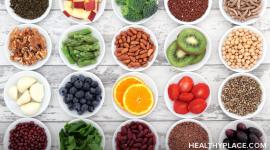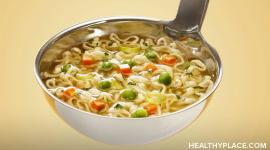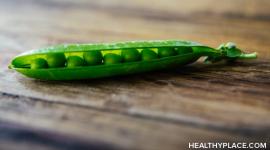References to ADHD and Food
Diet for ADHD: Does Food Really Make a Difference?
Danielson, Melissa et al. (2018). Prevalence of parent-reported ADHD diagnosis and associated treatment among U.S. children and adolescents. Journal of Clinical Child & Adolescent Psychology.
Schnoll R, Burshteyn D, Cea-Aravena J. (2003). Nutrition in the treatment of attention-deficit hyperactivity disorder: a neglected but important aspect. Applied Psychophysiology & Biofeedback, 28, 63–7
Food for ADHD: Which Foods Help and Hurt Your ADHD Child?
Howard, A., Robinson, M., Smith, G., et. al. (2018). ADHD is associated with a western dietary pattern in adolescents. Journal of Attention Disorders.
Food Dyes and ADHD: Do Food Dyes Cause Hyperactivity?
Nigg J., Lewis K., Edinger T., & Falk M. (2012). Meta-analysis of attention-deficit/hyperactivity disorder or attention-deficit/hyperactivity disorder symptoms, restriction diet, and synthetic food color additives. Journal of the American Academy of Child and Adolescent Psychiatry; 51:86–97
Best Diet for Your ADHD Child
Ghanizadeh A., & Haddad B. (2015). The effect of dietary education on ADHD, a randomized controlled clinical trial. Annals General Psychiatry. 14:12.
Schab D., et al. (2004). Do artificial food colors promote hyperactivity in children with hyperactive syndromes? A meta-analysis of double-blind placebo-controlled trials. Journal of Developmental and Behavioral Pediatrics; Vol. 25, No. 6, pp. 423–34
Is There a Diet Plan for ADHD?
Pelsser L., Frankena K., Toorman J., & Rodrigues-Pereira, R. (2017) Diet and ADHD, reviewing the evidence: A systematic review of meta-analyses of double-blind placebo-controlled trials Evaluating the efficacy of diet interventions on the behavior of children with ADHD. PLoS ONE; 12(1).
Swanson J., McBurnett K., Wigal T., et al. (1993) Effect of stimulant medication on children with attention-deficit disorder—a review of reviews. Except Child; 60:154–162
Diets for ADHD Hyperactive Child and Inattentive Type
Sinn, N. (2008). Nutritional and dietary influences on attention deficit hyperactivity disorder. Nutrition Reviews, 66, 558-568.
Stevenson, J. (2010). Recent research on food additives: implications for CAMH. Child and Adolescent Mental Health, 15(3), 130-133
Ketogenic Diet and ADHD: How Effective Is It?
Neal E., Chaffe, H., Schwartz, R., et. al., (2008). The ketogenic diet for the treatment of childhood epilepsy: A randomized controlled trial. Lancet Neurology; 7(6): 500–6.
ADHD Elimination Diet: Food Sensitivities in ADHD Children
Pelsser L., Frankena K., & Toorman J., et al. (2011). Effects of a restricted elimination diet on the behaviour of children with attention-deficit hyperactivity disorder: a randomised controlled trial. Lancet. 377: 494–503.
Diet for ADHD Adults: How Foods Affect Adult ADHD Symptoms
Wender, E. (1986). The food additive-free diet in the treatment of behavior disorders: a review. Journal of Developmental and Behavioral Pediatrics. 7(1): 35–42.
ADHD and Sugar: How Sugar Affects Your ADHD Child’s Behavior
Chung H., & Park S. (1995). The effect of sugar intake on attention deficit hyperactivity disorder of school children. Korean Journal of Nutrition. 28:644–652
Millichap, J., & Yee, M. (2012). Mixed reviews: The Diet Factor in Attention-Deficit/Hyperactivity Disorder. Pediatrics , 129(2), 330-337.
ADHD and Caffeine: The Effects of Caffeine on ADHD
Durlach P. (1998). The effects of a low dose of caffeine on cognitive performance. Psychopharmacology; 140: 116–9
APA Reference
Jarrold, J.
(2018, May 23). References to ADHD and Food , HealthyPlace. Retrieved
on 2025, April 19 from https://www.healthyplace.com/adhd/food-and-adhd/references-to-adhd-and-food




